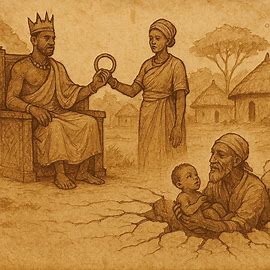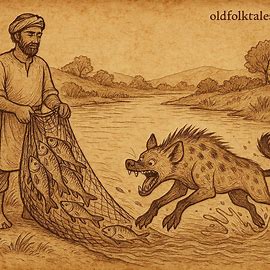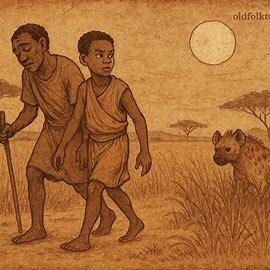Long ago, in the land of Kasanji, there lived King Kitamba kia Xiba, a mighty ruler who built his great village and governed his people with firm authority. Yet even the strongest of kings cannot escape sorrow. One day, his beloved head-wife, Queen Muhongo, fell ill and died. She was buried with honor, and the people mourned with wailing and lamentation until the formal days of grief ended. But for King Kitamba, the end of mourning did not come. His heart clung to her absence, and his grief became a shadow that fell upon the entire village.
The king declared, “Since my head-wife is gone, I shall not eat, I shall not drink, I shall not speak. In my village, no man shall raise his voice, no woman shall pound grain, and no child shall shout. Silence shall rule this place until you return my Queen Muhongo to me.”
The elders, troubled, answered him: “Master, death has come and taken her. We have never seen mourning like this, where a village must remain voiceless and still. What you ask cannot be done.”
But King Kitamba was unbending. “If you wish to hear me laugh, if you wish me to speak again, then bring me back my queen. Without her, silence is my only companion.”
The elders gathered and whispered among themselves, their concern heavy. At last, they resolved, “We must seek a powerful medicine-man. Only he can help us in this matter.” They sent for a renowned doctor, bearing gifts, his fee a gun as a calling present and a cow to cook as his meal. When the doctor arrived, they explained the plight:
“The head-queen Muhongo is dead. The king forbids speech and joy until she is returned from the land of the dead. Without her, he will neither eat nor drink. We ask you, doctor, to go to Kalunga, the realm of the dead, and bring her back, so that our people may live again in peace.”
READ THIS: Nianga dia Ngenga and His Dogs: An Angolan Folktale That Teaches Lessons on Obedience and Restraint
The doctor, calm and deliberate, nodded. “Very well. I will go.”
He wandered through the land, gathering sacred herbs, preparing charms, and fashioning his tools. Outside his hut, he placed a great mortar of medicine. “The king must wash here,” he commanded, “and all the people must also wash.” Obediently, the chief and the villagers cleansed themselves. Then the doctor ordered, “Dig a grave in my guest-hut, by the fireplace.” They dug deep until the pit was ready.
With his small child at his side, the medicine-man descended into the grave. Before the earth was sealed, he turned to his wife and gave her strict instructions: “Every day, you must not wear a girdle; tuck in only. And every day, pour water upon the fireplace. Do not fail.” The woman agreed. The grave was closed and sealed, appearing as though nothing had been disturbed.
In the depths of the earth, the doctor found a road opening before him. Hand in hand with his child, he journeyed down the path until they came upon a strange village. It was the village of Kalunga-ngombe, lord of the dead. There, in the center, sat Queen Muhongo, quietly weaving a basket.
When she looked up and saw him, she asked, “Stranger, from where do you come?”
“I come from Kasanji,” the doctor replied. “Since your death, King Kitamba has eaten nothing, drunk nothing, and spoken no word. The people labor in silence, for he has declared that only your return can end his mourning. It is for this reason I have come.”
Queen Muhongo shook her head gently. “Here, in Kalunga, none who come may return. Look there, do you see the man in chains?”
The doctor looked closely. “He resembles King Kitamba himself.”
The queen answered, “It is indeed your king. In a few short years, he too will die and join us here. This is the fate of all who live. Take this arm-ring, the one buried with me, so that when you return, the people will know you speak the truth. But tell the king nothing of what you saw, that I am here already, waiting.”
She warned him further: “Do not eat or drink anything in Kalunga. If you do, you will never return.”
The doctor obeyed and retraced his steps with his child until they reached the grave. On earth, his wife had poured water daily as commanded. One day, she noticed cracks forming in the fireplace. Soon, the doctor’s head appeared, then his arms. He pulled himself free and lifted his child into the light of day. The boy, seeing the sun, fainted from its brilliance. The doctor quickly gathered herbs, washed him, and revived him.
The next morning, he summoned the elders and told them everything Queen Muhongo had spoken. He showed them her arm-ring as proof. “This is the sign that I truly went to Kalunga,” he said. For his service, they rewarded him with two slaves, and he returned to his home.
The elders reported faithfully to the king. “The doctor went to Kalunga and saw Queen Muhongo. She sent back this arm-ring as a token. She said no one returns from Kalunga, but she has not forgotten you.”
King Kitamba took the arm-ring in his hand, his heart heavy. At last, he ate, he drank, and his silence lifted. Yet, as the queen foretold, after a few years, King Kitamba died. The people mourned him deeply, and the village scattered.
Thus ended the story of King Kitamba kia Xiba of Kasanji.
Moral Lesson
This tale reminds us that grief is a powerful force, but one that must eventually give way to acceptance. King Kitamba’s refusal to let go of his wife’s death burdened not only himself but his entire village. The journey of the doctor to Kalunga reveals that death is irreversible, and wisdom lies not in clinging to what cannot be restored but in embracing the life that remains.
We are taught that mourning is natural, but obsession with loss can destroy balance and joy. Acceptance of death is the path to peace, for kings, for families, and for whole communities.
Knowledge Check
Who was King Kitamba kia Xiba’s head-wife?
Queen Muhongo.
Why did the king forbid speech and activity in the village?
He demanded the return of his late wife before life could continue.
What task did the medicine-man undertake?
He descended into Kalunga, the land of the dead, to find Queen Muhongo.
What item did Queen Muhongo give as proof of the doctor’s journey?
Her burial arm-ring.
What warning did the queen give the doctor in Kalunga?
Never to eat or drink there, or he could not return.
What lesson does this folktale teach?
That grief must be balanced with acceptance, and death is final.
Source: Kimbundu folktale, Angola.






